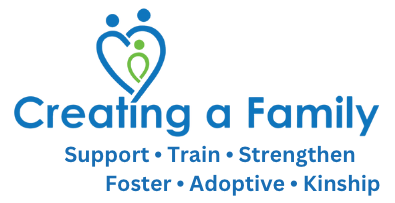Many of us raising children through adoption, foster care, and kinship care struggle to manage relationships with birth parents who struggle with a substance use disorder. We ask questions like, “Can the Birth Mom still visit when she is high?” and “How do we handle all the broken promises to call or visit our child?”
Accept the Complexity of This Relationship.
There are no easy answers to dilemmas like these (and the many others you will likely face). Substance use disorders occur across all economic, religious, cultural, and social demographics. Substance use disorder complicates relationships between you and your child, your child with their birth parents, and between you and the birth parents.
However, when active substance use and misuse hits as close to home as your child’s birth parents, it’s easy to be judgmental or draw hard lines – even going as far as wanting to cut them out of the child’s life. Of course, if you are a foster parent or doing kinship care through the foster system, you don’t get to decide that on your own. While adoptive parents and informal kinship caregiving might have more latitude to make a choice like this, we always advise thoughtful caution and education before doing so.
Managing Relationships with Birth Parents with Substance Use Disorders
These tips may give you other options to help keep your child safe while managing some relationship with the birth parents that benefits your child.
1. Recognize the Value of the Relationship.
Decide that the foundation of this relationship is your mutual love of this child. Even if you feel like it’s an assumption, decide it’s a fair premise to build. With that mutual love comes a desire to keep the child’s best interests at the core of all you do. With your commitment to assuming the best, you can approach the child’s birth parents as valuable members of your child’s life.
Even when a birth parent struggles with an active addiction, you can see the value they bring to your family and this child’s life. You can operate from a pure intention to find the best way to move forward and honor a healthy path ahead.
2. Lay the Ground Rules.
In the case of a new foster or kinship placement, lay out your ground rules for interacting with the child from the beginning. It would help if you worked with the child’s caseworker to understand their safety policies and contact rules. You can request a meeting to get everyone on the same page for this child’s best interests.
For families already in a long-term relationship with birth parents, you must consider carefully how to backtrack and establish rules. It will help to set up a meeting with the birth parents without the child present. Please give them a heads-up about your desire to develop guidelines for managing your relationship, visits, and safety plans. This allows them time to process and prepare. Assure them that you’d also love to hear their ideas and thoughts.
At your meeting, explain that you are looking for ways to honor their relationship with your child, to keep the child safe, and to allow room for this relationship to grow in a healthy direction. Assure them that you know they love this child, and these ground rules will be worked out between you, with the child’s best interests at the core.
Parenting a Child Exposed to Trauma
3. Be Flexible About Visits, Calls, and Contacts.
When a birth parent is struggling with substance use disorder, inevitably, visits, calls, and meetings will occasionally fall short of your expectations. Be gracious whenever possible by offering flexibility in meeting days, times, and even locations.
For example,
“I notice when you show up high, it’s challenging to stay engaged with Janie. She really needs to connect with you at visits. Would 10:00 in the morning be a better time? We could meet at the coffee shop on Main Street.”
Of course, if you are fostering or caring for a relative’s child through the formal foster system, you need to work with the child’s caseworker over these changes. It’s extra work for you, but it’s worth it to maximize the child’s opportunity to connect in healthier ways with their birth parent. If it is safe for the child and the case worker agrees, your flexibility and emotional regulation will model how healthy relationships unfold.
The holiday season brings added layers of challenge to visits and calls with birth parents. Often, holiday memories can be a trigger for your child – and their birth parents. Heightened emotions can be dysregulating and make everyone feel a little more vulnerable to disappointment or dashed expectations. Again, be gentle, gracious, and flexible with your child and their birth parent. Consider offering what you can to ease the big emotions, even if it’s not the typical contact you maintain throughout the year. This can also apply to birthdays and other cultural events your child’s birth family observes.
Your ability to demonstrate flexibility and graciousness in these moments of high stress will also buffer you and your child from additional stress. It’s also a powerful lesson in compassion and empathy for another person’s struggles.
4. Expand Your Definition of “Family.”
Occasionally, a relationship with your child’s birth mother or father is impossible, even if only for a season. Consider who else in their birth family can be your child’s supportive, caring contact. Frequently, grandparents, cousins, or aunts and uncles are willing to enter relationships with the child. The additional connections can help your child feel anchored even when their birth parents are unavailable. Again, when you are working with the formal child welfare system, please work this option out with the child’s caseworker to amend the visitation agreement.
Gatherings during the holidays can be a natural “in” to this expanded family experience. Welcome them to a family dinner or your town’s tree-lighting ceremony. Reach out and ask if they’d bring a batch of their famous holiday cookies to this week’s visit. Take part in a cultural event together.
Choosing an expansive view of how your family comes around this child can bring increased joy for all of you. This joy can also mitigate much of the pain the birth parents’ extended family may feel while their loved one struggles.
5. Managing Visits When a Birth Parent is Obviously Using.
If you feel strongly about not allowing the child to visit when the birth mother or birth father is obviously experiencing effects of substance use or misuse, be consistent and precise in communicating that to them. Try a few things to reinforce your preference to manage visits when a birth parent is using:
- Ask someone in the birth parent’s life to check with them on the day of your meeting to determine if they are too impaired for a safe visit. If they are, cancel the appointment and resume at the next scheduled time.
- Work with another neutral third party who will meet with the birth parent right before a scheduled visit.
- The caseworker can require a birth parent to arrive 30 minutes earlier at a neutral meeting place where safety and sobriety are assessed. Again, cancel and reschedule if the birth parent is unsuitably impacted by substance misuse.
- Require a blood test to detect the presence of drugs. This is a long-term approach, as blood testing takes considerable time. And there is the risk that the birth parent could misuse a substance between the test and the scheduled visit. Additionally, blood tests require abstinence over an extended period. What you might need to prioritize is safety and sobriety today.
- Consider meeting with your child’s birth parent immediately before they visit your child. Use the time to catch up on how the child is doing while assessing whether the visit should proceed.
6. Be Respectful and Positive.
Speaking of your child’s birth parents with dignity and respect is crucial. Yes, they are struggling. Yes, they have disappointed your child in the past. But they also bring value to your child’s life. Their story is intertwined with yours and your child’s. They are an integral part of your child’s developing identity.
Even when you struggle to see the good in this moment, find something positive to say about them to your child. By acknowledging their struggle and offering positive support for them and their family, your child learns you are trustworthy and present with them for the experiences. Your child will also learn open-hearted, compassionate care for their expanded family.
7. Don’t Set Things in Stone.
Occasionally, you may feel it’s in your child’s best interest to change the contact your child has with their birth family. Be careful not to write a new plan in concrete. After all, people heal from substance use disorders and live healthy, productive lives. Offer them space to grow and change and consider when and how to re-evaluate your contact in the future.
8. Maintain a Spirit of Openness
In those times when your child cannot safely have in-person contact with their birth parents, consider creative ways to maintain a spirit of openness. Here are a few ideas we’ve heard from those with lived experience of managing relationships with birth parents:
- Set up an email address or text chain specifically for contact between the birth parents and the child or between you and the birth family.
- Stay in contact with the birth mother or father’s extended family to keep up with them and allow your child to connect with extended family.
- Create a closed Facebook group to share information, updates, pictures, and achievements the child’s family wants to know.
Again, if you are working with the child welfare system to care for this child, work with the caseworker on any changes to visitation and contact.
Open Adoption: Handling Difficult Birth Parent Situations
Hard Work But Worth It!
These relationships can be messy, challenging, and painful. However, when you committed to this child, you also committed to all of who they are — and their birth parents are part of that unique preciousness. Digging in to maintain this relationship might be the hardest part of raising this child. But it might also be the most rewarding and joyful work you do when you consider how it helps your child’s sense of self and confidence in their story. The lessons you learn together on the way are valuable as well.
Tell us in the comments: how are you maintaining relationships with birth parents amid substance use struggles?
Image Credits: Ryutaro Tsukata; Odonata Wellnesscenter; cottonbro studio




Add Your Comment